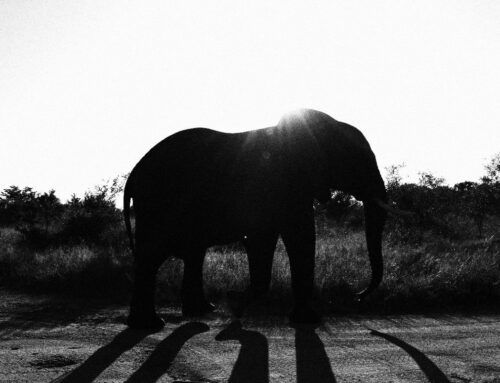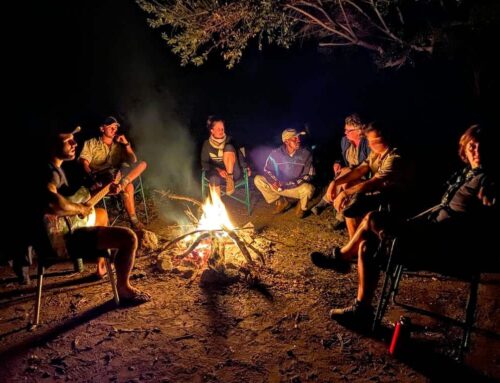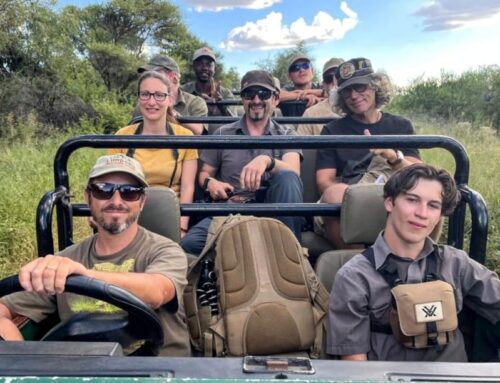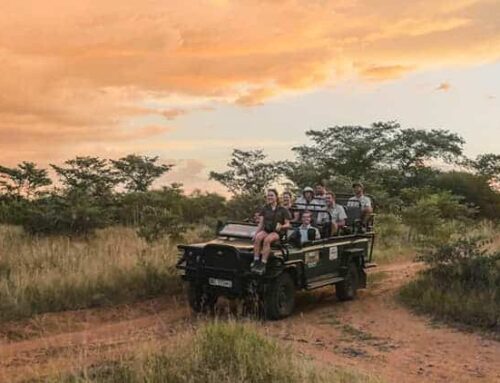Next year will be the twentieth year that we have been doing what we love, which is empowering young people with the knowledge to pursue their passion in the world of nature and in so doing, providing the field guiding industry with great resources.
The past twenty years have provided us with thousands of insights that have taught us a thing or two about life in the bush, many of which are applicable to life in general.
We have chosen twenty examples that we think will shed light on how to refresh your perspective and place a greater emphasis on the balance of life on our extraordinary planet.
1. Life is short
Many students are not recent school leavers and not looking to pursue a career in field guiding. They rather look to quench their thirst for knowledge and adventure. Although keen nature enthusiasts, they often remark at how they wish they had done a field guiding course earlier in life. How many people would have had a greater enthusiasm for nature if they had pursued their knowledge of it? Find your passion and go for it!
2. Family and community are important
To survive, family instincts in the wild are crucial. The care that a herd of elephants show to their young is exemplary, with any one of the adults stepping in to protect the young when required, irrespective of whether there is a direct relationship or not. This sets such a good example for humanity. Imagine what the world would be like if we all showed a similar level of care, not just to our families, but to our communities, nation and global society.
3. Self-fulfilment
Spending time in nature gives you a better knowledge of yourself. Perhaps it is the moments of solitude, observing the immensity of the night skies or trying to fathom the complexity of a termite mound. Whatever it is, having a better understanding of who you are, is a fundamental step in fulfilling your hopes and dreams.
4. Connection with the earth
Respecting our place in the natural world has given us greater insights into how we need to behave if we want to leave a legacy for future generations. Greed, wasteful consumption and the accumulation of unnecessary items do not occur in nature. Survival instincts are strong and guide behaviour as opposed to what we see in humanity where excess is often measured as success. If we connect with the earth, we quickly learn to appreciate that life should be more about quality than quantity.

5. The world is accessible
We have been fortunate to be able to share our passion for the bush with students of all nationalities. It is fascinating to witness the transition of those from cosmopolitan backgrounds as they absorb a new set of values that are inspired by nature. We are achieving our goal if this knowledge is shared with friends and family back home, generating more appreciation for wonders that are around us, wherever we are!
6. The value of conservation
While many species remain under threat, we have witnessed some of the conservation successes that have occurred over the past 20 years. There is undoubtedly a greater consciousness about the human impact on our planet than there ever has been before. We have observed and participated in the ventures like the Mabula Ground hornbill Project, which has demonstrated the enormous impact that passion can have on a project, despite its humble beginnings.
7. Take pleasure in the smaller things in life
You may not realise it, but nature starts at home. There are incredible processes that are taking place everywhere, in our gardens and city parks. Your garden can be a healthy ecosystem! Don’t be annoyed by that croaking frog, they are an indicator species that are vulnerable to an unbalanced environment. Sitting at a waterhole in the bush as the sun goes down, listening as the evening sounds kick in, these are moments that will give you great pleasure, but you need to pay attention!
8. Gratitude is the key to happiness
Appreciation of the nature around you will teach you gratitude. Today’s world is filled with electronics, everything is designed for convenience and all of this has become so commonplace that if removed, many of us do not know what to do with ourselves. In nature, things are often slowed down, actions are measured or guided by an instinct that has been formulated over thousands of years.
We have witnessed the change in students who join our program. The transition from living in a convenience-based world to the discovery of nature is enlightening. Taking time to consider the things you are grateful for shows you, not only how much you have, but also how little you need to be happy. Consider traditional cultures that live in similar ways to their ancestors, they understand that less is more when it comes to living a happy life.

9. Symbioses, what is that?
Symbiosis is a term describing any relationship or interaction between two dissimilar organisms. The specific kind of symbiosis depends on whether either or both organisms benefit from the relationship. These sorts of relationships are fairly common in nature, consider aphids and ants, oxpeckers and large mammals, honeyguides and humans and in the marine world, clownfish and anemones. Imagine a world where we embraced our differences and capitalised on our strengths for the greater good of the community. Well, nature does this all day long!!
10. Experience, experience, experience
Experience is invaluable! To gain experience, we need to be able to learn, to listen and accept that we do not know as much as we thought. We might be equipped with all the theory but putting that into practice may differ slightly from the textbook. We appreciate that the practical application of theory is key to building that invaluable ingredient, experience!
11. Take time to reflect
Frantically busy days often leave us wanting to go to sleep as soon as our head hits the pillow. But reserving time to reflect on your day is so important. This reflection will also teach us patience. Consider a predator waiting for the right moment to attack its prey. This takes considerable patience and without it, many opportunities would be lost. If humanity spent more time reflecting on what their objectives were, how much more accomplished we may all be.
We encourage a balance in all that we do. There is time for work, there is time for play and don’t forget, take time to reflect!
12. Observe your surroundings
Observation and awareness of what is taking place around you is key to survival in the natural world. In our world, taking careful note of your surroundings, not only enhances your knowledge and understanding of your environment but teaches you to listen without your ears. It offers opportunity to connect with people, nature and concepts on a deeper level.
Listening is an overlooked skill but can improve relationships of all kinds.
13. Nature subtly commands respect
After 20 years of field guiding teaching experience, we have become comfortable with the surroundings. Learning wild animals’ behaviour and signs of unease allows you to immerse yourself deeper in the natural environment than those who have not had the benefit of being exposed to nature as we and our students have.
Every so often we will experience an “outlier”, the unforeseen, an animal behaving in an unusual way, an unanticipated change in weather conditions or a mechanical problem and these all serve to remind us that we remain vulnerable if we do not pay attention.
Respect nature and remember to expect the unexpected!
14. The magic of sunrises
20 years equates to 7300 sunrises. A sunrise, if captured with the right mindset remains one of the most inspiring moments of the day. We have seen students that have arrived dreading early morning starts, quickly appreciating how each unique sunrise serves as a tonic to embrace the day.
Experiencing this bifurcation that is overlapped by the natural world, where nocturnal animals settle in for the day and diurnal animals come alive to start their morning rituals, is something that we never tire of.
15. Discomfort is a teacher
We are all more capable than we think! Pushing ourselves outside of our comfort zones is where we learn what we are really made of! There is a sense of achievement when we see our students, sometimes to their great surprise, exceeding their expectations. They have gone into what was perceived to be an uncomfortable experience successfully, having turned a challenge into an enriching experience.
16. Location, location, location
It’s true! Limpopo Field Guiding Academy has been fortunate to have been located in one of the most biodiverse regions of South Africa. The transitional zone between the savannah and grassland biomes gives us access to an abundance of fauna and flora species that makes it a sought-after destination.

17. Stars uncover the truths of the universe
Being in a place where a full canvas of stars can be seen, makes the mind richer. Seeing light that has traveled millions of light years from distant galaxies to the photoreceptors in your eyes can make you feel small but connected. Allowing your mind to wander in awe at the complexity of our existence make us truly appreciate that life is far more magical than many of us perceive. The natural world’s orchestra in the background helps to enhance the moment!
18. Don’t feel you need to fit in
Just because something is the norm doesn’t mean that it is for you. Some of our students don’t perform well in a traditional schooling environment but excel in our courses. Parrot fashion learning and regurgitation of information to pass an exam is not the be all and end all. There are many famous and successful individuals who never completed their education but managed to influence the world. Some examples include Winston Churchill, Bill Gates, Ted Turner and Coco Chanel.
Stay in school though, if you survive it you can do anything!
19. Campfires make for the best connection
There is nothing more rewarding than sitting around the fire with people you shared a long day in the bush with. The outside fire presents an environment with no inhibitions that lead to free-flowing stories, some deep and others exaggerated of course, but fun, nonetheless.

20. Time heals
Twenty years of educating students of ages and a diversity of backgrounds presented us with countless opportunities to see how time unfolds.
We have seen seedlings growing into majestic trees, only to be pushed over by young elephants as they succumb to the forces of nature. Although death is sad, once you appreciate how the loss of life in one aspect of nature may mean the survival of something else, it becomes understandable.
In nature, time has a way of healing all!
Of all the experiences, learnings, tough times and happy moments as well as the great people we have had the privilege of meeting, we realise that gratitude is important to improving all areas of our lives. We take special consideration for what we have and this helps us realise the abundance in our lives.
We look forward to the sunrise of the next 20 years of Limpopo Filed Guiding Academy and the future experiences that we can share with others.
Stay tuned for more insight and adventures from Limpopo Field Guiding Academy.
All course enquiries:
+27(0)72 625 4709
+27(0)14 007 0621







Leave A Comment